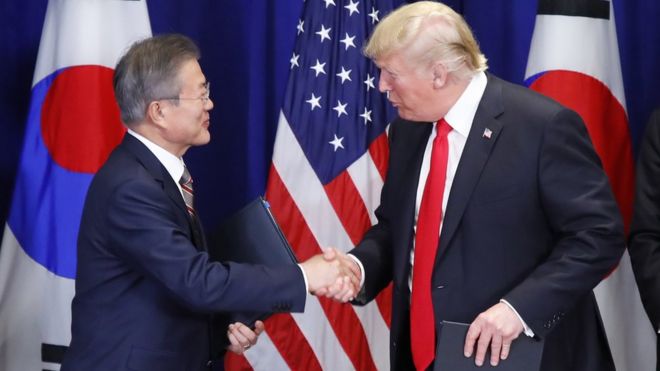
Donald Trump has signed a revised trade pact with South Korea, aimed at expanding opportunities for US carmakers and pharmaceutical companies.
It marks the first such agreement finalised by the US president, who has promised to overhaul his country's trade relationships.
At a press conference in New York, Mr Trump called the updates to the 2012 agreement "a very big deal".
The White House first announced the outline of the changes in March.
Most analysts said the revisions were relatively modest.
The completion of the pact came as Mr Trump faced a number of political controversies, including the sexual harassment allegations against his nominee to the Supreme Court.
Businesses are also worried about the impact of retaliatory tariffs to those Mr Trump's administration has imposed on steel and aluminium imports and Chinese goods.
Mr Trump said the signing, which took place on the sidelines of the United Nation's General Assembly, was "a great day" for the US and South Korea.
He described the revised pact as a "brand new agreement" and a sign that his trade strategy was working.
"In addition to this deal, we have many in the works, and they are fair deals," he said.
South Korean President Moon Jae-In focused his remarks on denuclearisation talks with North Korea, in which the US has been involved.
He said the new trade agreement, which still needs approval by South Korea's parliament, was a sign of the strong partnership between the US and South Korea.
Details of the deal
The US started negotiations with South Korea last year, following Mr Trump's criticism of the 2012 deal as a "one-way street".
Under the new terms, South Korea has agreed to exempt up to 50,000 cars per US manufacturer per year from South Korean safety requirements - double the current number and far higher than any American company currently exports.
The country has also agreed to changes such as improvements to its customs procedures and amendments to its drug pricing policies.
The agreement also extends a 25% US tariff against South Korean trucks to 2041. It had been scheduled to expire in 2021.
Separately, the US agreed to exempt a certain amount of South Korean steel from the 25% tariffs Mr Trump announced in March - equivalent to 70% of the country's average imports from 2015-2017.
South Korea and the US are major trade partners, exchanging nearly $155bn in goods and services in 2017.
No comments:
Post a Comment